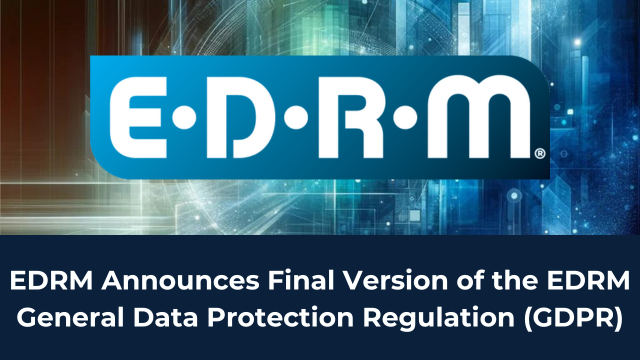
MINNEAPOLIS, MN, USA, April 5, 2024 /EINPresswire.com/ — Leading the way for global best practices in e-discovery, the Electronic Discovery Reference Model (EDRM) is pleased to release its “General Data Protection Regulation Cross-Border Discovery Guidelines.” The guidelines were updated after an extensive public comment period.
Parties that have possession, custody, or control of evidence potentially relevant to U.S. litigation or investigations are typically required to identify, collect, preserve, and produce such evidence (with limited exceptions) in response to discovery requests, subpoenas or litigation demands, regardless of where that evidence is located. Those requirements, however, may directly conflict with provisions in the European and UK General Data Protection Regulation (GDPR).
Where litigation or investigation matters involve evidence located in Europe or the UK, parties are put into a difficult position of determining how to comply with U.S. discovery and/or production obligations without violating the GDPR.
David Cohen, Partner, Reed Smith LLP, co-project trustee.
EDRM established the project team to develop guidelines and other resources to assist practitioners with compliance. The updated guidelines can be downloaded here.
“Where litigation or investigation matters involve evidence located in Europe or the UK, parties are put into a difficult position of determining how to comply with U.S. discovery and/or production obligations without violating the GDPR,” said David Cohen, a Reed Smith partner who co-chairs the EDRM project team that developed the guidelines and related resources. “For even a single GDPR violation parties can be fined up to the greater of 20 million Euro or 4% of a company’s annual worldwide revenue. Practitioners do not want to face such liabilities. The guidelines, accompanying checklist, model hold notice, and model protective order were developed by our EDRM team to help facilitate compliance.”
Members of the EDRM project team included U.S. legal and privacy professionals, and also international lawyers who are members of the Commercial Litigation Association of Ireland (CLAI). “The Commercial Litigation Association of Ireland is delighted to endorse the EDRM’s Data Protection Guidelines, which are an invaluable tool for lawyers in understanding and ensuring their obligations under the General Data Protection Regulation when engaged in cross-border litigation,” said Helen Kilroy, Chair of the CLAI.
The Commercial Litigation Association of Ireland is delighted to endorse the EDRM’s Data Protection Guidelines, which are an invaluable tool for lawyers in understanding and ensuring their obligations under the General Data Protection Regulation when engaged in cross-border litigation.
Helen Kilroy, Chair of the Commercial Litigation Association of Ireland (CLAI).
“The standards relating to application of the GDPR are still evolving, as various privacy authorities, including the European Data Protection Board, continue to provide new guidance,” noted Yelizaveta Kotova, an E-Discovery Attorney at Reed Smith, who co-chairs the EDRM GDPR Project Team. “Our team is continuing its work, both to update the Guidelines when necessary, and to create judicial training programs to assist judges who may need to address GDPR issues in the context of U.S. litigation discovery.”
The standards relating to application of the GDPR are still evolving, as various privacy authorities, including the European Data Protection Board, continue to provide new guidance. Our team is continuing its work, both to update the Guidelines when necessary, and to create judicial training programs to assist judges who may need to address GDPR issues in the context of U.S. litigation discovery.
Yelizaveta Kotova, E-Discovery Attorney at Reed Smith, LLP, co-project trustee.
“Globally, there’s a significant appetite for these resources,” said Mary Mack, EDRM’s CEO and chief legal technologist. “Those stewarding litigation or regulatory investigations that implicate evidence from the EU or the UK will find the templates to be a great starting point.”
EDRM is grateful to the project team (organizations noted for identification purposes only):
• Tamara Barnes, Senior Consultant eDiscovery, UnitedLex (Odessa, FL)
• Chris Bojar, Director of eDiscovery & Litigation Support, Barack Ferrazzano Kirschbaum & Nagelberg LLP, USA (Chicago, IL)
• David Cohen, Partner, Reed Smith LLP, USA (Pittsburgh, PA), Co-Trustee
• Anna Mercado Clark, Partner, Phillips Lytle, USA (New York, NY)
• Yelizaveta Kotova, eDiscovery Attorney, Reed Smith LLP, USA (Pittsburgh, PA), Co-Trustee
• Wayne Matus, Co-Founder and General Counsel, SafeGuard✓Privacy, USA (Sarasota, FL)
• Ruth McAllister, Senior Associate, McCann Fitzgerald, Ireland (Dublin)
• Briordy Meyers, Discovery Counsel, Google, USA (Washington, DC)
• Niamh Murphy, Director of eDiscovery, Arthur Cox, Ireland (Dublin)
• Ines Rubio, Senior Director of Technology, FTI Consulting, Ireland (Dublin)
• David Sweetman, Counsel, Law Library, Ireland (Dublin)
• Jonathan Swerdloff, Director, Global Client Data Services and eDiscovery, Scott & Scott LLP, USA (New York, NY)
The EDRM community is comprised of 33% corporations, 30% law firms, 23% software and service providers, and 12% governments, with the remaining 2% a mix of educators, students, judges, and media in 145 countries spanning six continents.
Read the original release here.
About EDRM
Empowering the global leaders of e-discovery, the Electronic Discovery Reference Model (EDRM) creates practical resources to improve e-discovery, privacy, security, and information governance. Since 2005, EDRM has delivered leadership, standards, tools, and guides to improve best practices throughout the world. EDRM has an international presence in 145 countries spanning six continents and growing and has an innovative support infrastructure for individuals, law firms, corporations, and government organizations seeking to improve the practice and provision of data and legal discovery. Learn more about the EDRM today at EDRM.net.
About EDRM’s GDPR Cross-Border Discovery Project
EDRM formed the team in August 2017 to develop guidance and resources for compliance with regard to cross-border discovery. The guidelines can be downloaded here: https://edrm.net/edrm-projects/gdpr-project/.
Contact info@edrm.net for more information on how to get involved in our global project community.
EDRM Media Contact
Kaylee Walstad
Chief Strategy Officer, EDRM
+1 612-804-3244
email us here

